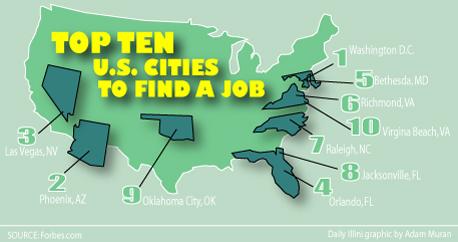Seniors face fear of searching for jobs

ME Online
January 30, 2007
For many underclassmen, the “real world” seems to loom far off in the distance. For graduating seniors, however, it’s time to become a fully functional adult, wistfully leaving the college days behind. For some, that means first and foremost finding a job.
“I’ve been looking for a position in the pharmaceutical industry,” said Jack Kresl, senior in LAS. “I think the job market is decent.”
The job market this year is in fact better than decent: According to Job Outlook 2007 (from the Nat’l Assoc. for Colleges and Employers Fall (NACE) 2006 survey), employers plan to hire 17.4 percent more new college graduates from the class of 2007 than they did from the class of 2006.
“In the last two to three years, we’ve seen an increase in campus recruiting,” said Gail Rooney, Ph.D., Director of the Career Center.
According to the Recruiting Trends 2006-2007 study by Dr. Phil Gardner, Research Director for the Collegiate Employment Research Institute at Michigan State University, employers are aggressively hiring in anticipation of pending “Baby Boomer” retirements. This employer base is comprised mainly of large organizations in the manufacturing, utilities, retail and professional services sectors of the economy. Joining them are small (less than 60 employees) entrepreneurial firms focused on engineering design, computer applications and research.
Get The Daily Illini in your inbox!
Rooney said that students may want to look at small and medium-sized companies for opportunities that give a breadth of experience and offer opportunity for advancement. However, she cautioned that students should research the company’s history before diving in.
“The risk is that a smaller, more entrepreneurial company might lose business and have to let people go,” Rooney said. “However, it all depends on the company; for example, a place like Caterpillar is here to stay.”
Many employers have a specific major or training in mind when seeking potential job candidates. According to the Recruiting Trends 2006-2007 study, this year the academic majors in high demand include: business, accounting, marketing, finance, electrical engineering, mechanical engineering, civil engineering, computer services and nursing. Sales and marketing continue to be the key positions employers plan to fill.
However, some employers continue to seek graduates from any academic major, while others are specifically looking for communication, environmental science, social services, psychology and chemistry majors, to name a few.
Unfortunately, many employers are also cutting back on hiring as the economy slows. According to the study, “two powerhouses in adding jobs over the last 3 years are sharply reducing their hiring: construction and retail.” As a result, industries linked to these two sectors are cutting back as well. Job losses in the manufacturing sector, while still on the decline, seem to have bottomed out.
The study also detailed which industries plan on increasing hiring this year. Defense-related sectors, utilities, transportation (railroad, freight and delivery services), electronics, food manufacturing, medical devices and food and lodging all plan on upping the number of new hires.
According to Job Outlook 2007, employers in the South expect the biggest increase in hiring 2006-07 graduates; they plan to increase hiring by over one quarter, 25.5 percent, and more than half, 62 percent, plan to be on campuses in spring 2007 to recruit many of those new hires. Employers in the West also plan to increase their hiring by 23 percent while employers in the Northeast will increase hiring by almost 17 percent. Midwestern employers project an average increase of 10 percent.
“Employers are optimistic about their hiring plans,” Andrea Koncz, NACE employment information manager, said in the NACE study. But “don’t sit back and wait for an employer to find you. The better job market doesn’t mean finding a first job will be an easy ride,” she says. “If you want a job at or soon after graduation, you’ll need to work hard at your job search.”






